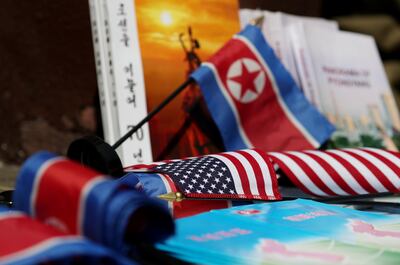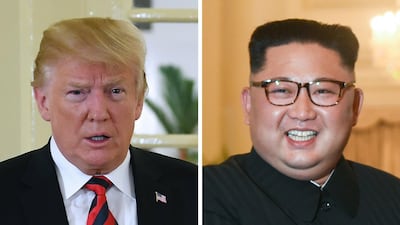The preamble to Tuesday's historic summit between North Korean leader Kim Jong-un and US President Donald Trump has centred on the rhetoric.
The latter man has been focused on the stipulation Pyongyang will "have to de-nuke".
But for those who have followed North Korea's nuclear programme over the years, Mr Trump's demand is easier said than done.
Jung Pak, a former CIA operative and current SK-Korea Foundation Chair in Korea Studies at the Brookings think tank in Washington DC, says a process of denuclearisation would run against the mindset of Pyongyang's leadership.
"The nuclear weapons are part of his national identity and a part of the cultural, ideological, political infrastructure that keeps him afloat," Ms Pak said of the Kim leadership during an event at Brookings.
Assuming that engagement or economic openness – the latter is the main carrot dangled by the Trump administration – can change the North's policy, it would be "almost antithetical, almost offensive in a way, for somebody who has achieved and completed his grandfather's goal,” to change tack, she said in reference to Kim Il-sung's arms programme in the 1950s.
On Saturday, Mr Trump said that he would know "within the first minute" if Mr Kim was sincere about giving up his nuclear weapons. "That's my touch, my feel, that's what I do."

But Ms Pak warned of the Korean leader's ability to mould his message and behaviour to different countries, without ever shifting his goals.
____________
Read more:
President Trump and Kim Jong-un arrive for historic meeting - live updates
US and North Korea officials in final summit preparations
Trump-Kim summit: A meeting of maverick minds in Singapore
____________
So far, the focus has been on personality, rather than policy.
"He's not looking at the US government as an entity to deal with, but more so in terms of how to manage Mr Trump," Ms Pak said. "They're looking to appeal directly to Mr Trump's preferences and priorities in their mentions of the Trump model."
Mr Trump's record with past agreements raises questions about how he will treat future deals. His short tenure as president has seen him pull out of accords – most recently the painstakingly negotiated Iran nuclear deal.
"Why would Kim ... believe any commitments President Trump makes when he arbitrarily tears up an agreement with which the other party is complying?" said Antony Blinken, who was deputy secretary of state under Barack Obama and, earlier, a senior national security adviser at the White House.
Mr Kim's concern is the survival of his own regime – South Korean President Moon Jae-in, who has no current plans to attend the summit, said that the North's leader had "concerns on whether he could trust that the US would end its hostile policy and guarantee the security of his regime when the North denuclearises itself".

The fragility of the summit remains – it was already called off once by Mr Trump, who cited the hostility of Mr Kim's officials.
The American president's comments, and Pyongyang's reaction, had been preceded by US National Security Adviser John Bolton's talk of a "Libya model" of disarmament, remarks that evoked the eventual fall of the latter country's longtime dictator Muammar Qaddafi.
Ms Pak told The National that for the summit to be successful "we have to find opportunities where we can. At a minimum we need to get Kim Jong-un on paper saying he is willing to denuclearise and ... that he wants to join the family of nations."
Regardless of the outcome, said Ms Pak, the Singapore meeting marks an accomplishment that both Mr Kim's father and grandfather were unable to achieve – holding a tete-a-tete with a US president. They "derive legitimacy and status" from such a meeting, said Ms Pak.
Mr Kim could leave the summit having given just "a vague statement, vague smiles [and a] big banquet", said Ms Pak. "It's up to Kim if he's going to be a bad actor, or if he's just going to stay quiet."
However, the summit's failure to convince Pyongyang to denuclearise would mean the squandering of momentum and the gradual build-up of pressure on North Korea through sanctions and isolation.
While Mr Trump and Mr Kim spent Monday with advisers in luxury Singapore hotels less than half a mile apart, Ms Pak says the televised summit is going to "be with the optics of North Korea looking normal. Making it harder and harder to get the international community back on board to crack down on illicit activities".
But a big stumbling block remains.
North Korea, Ms Pak said, has yet to give up anything it truly wants.

